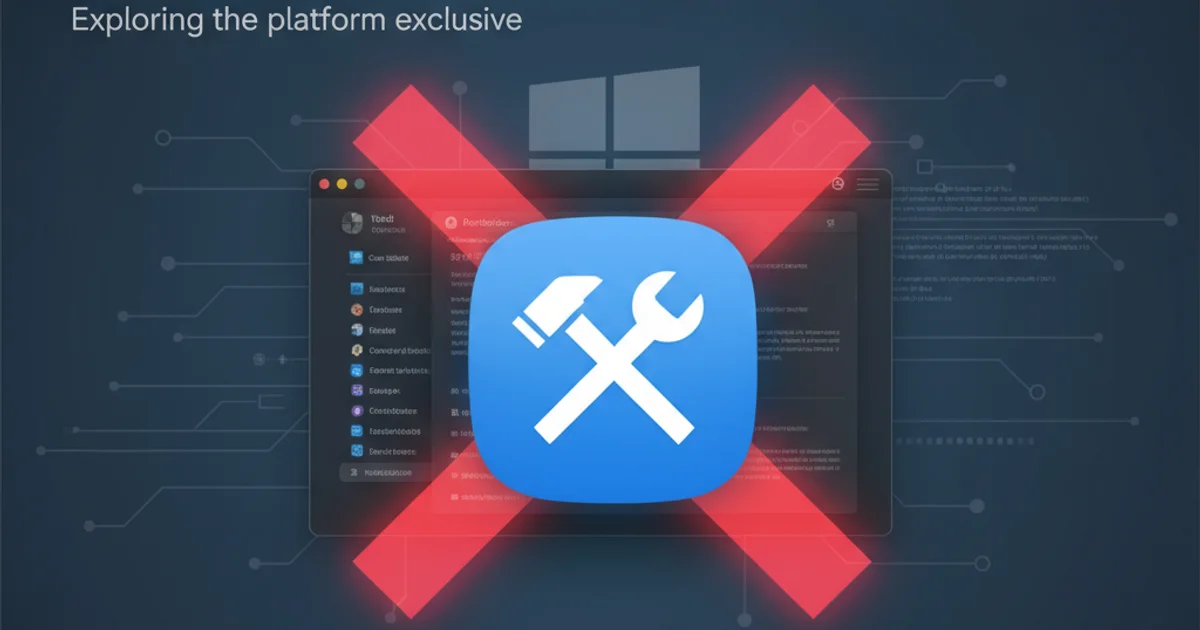Why isn't there Xcode for Windows?
Categories:
Why Isn't There Xcode for Windows? Understanding Apple's Ecosystem

Explore the fundamental reasons behind Xcode's macOS exclusivity, delving into Apple's integrated hardware-software strategy and its implications for developers.
Developers often wonder why Apple's integrated development environment (IDE), Xcode, isn't available on Windows. This question touches upon core aspects of Apple's business model, its software development philosophy, and the tightly coupled nature of its hardware and software ecosystems. Unlike many cross-platform development tools, Xcode is deeply intertwined with macOS, making its porting to other operating systems a complex and, from Apple's perspective, undesirable endeavor. This article will break down the technical, strategic, and historical reasons behind Xcode's macOS exclusivity.
Apple's Integrated Ecosystem Strategy
At the heart of Xcode's macOS-only status is Apple's long-standing strategy of controlling both the hardware and software experience. This vertical integration allows Apple to optimize performance, ensure security, and deliver a consistent user experience across its devices. For developers, this means that the tools used to build applications for iOS, iPadOS, watchOS, and macOS are designed specifically for the Apple hardware and software stack. This approach contrasts sharply with companies that focus solely on software or hardware, allowing for greater control over the entire product lifecycle.
flowchart TD
A[Apple's Integrated Ecosystem] --> B{Hardware Control}
A --> C{Software Control}
B --> D[Optimized Performance]
C --> E[Consistent User Experience]
D --> F[Xcode on macOS Only]
E --> F
F --> G[Enhanced Security]
G --> H[Unique Developer Experience]Apple's Integrated Ecosystem Strategy and its Impact on Xcode Availability
Technical Dependencies and Frameworks
Xcode is not just an IDE; it's a comprehensive suite of development tools that relies heavily on macOS-specific frameworks and technologies. Key components like Cocoa, SwiftUI, Metal, and various system libraries are fundamental to how Xcode operates and how applications are built for Apple platforms. These frameworks are proprietary and deeply integrated into the macOS kernel and user-space components. Replicating this intricate dependency tree on Windows would require an immense engineering effort, essentially rebuilding large parts of macOS for a different operating system. Furthermore, the Objective-C and Swift compilers, while open-source in their core, are optimized for the Apple toolchain and runtime environment.
// Example of macOS-specific framework usage in Objective-C
#import <Cocoa/Cocoa.h>
@interface MyWindowController : NSWindowController
@end
@implementation MyWindowController
- (void)windowDidLoad {
[super windowDidLoad];
// Implement window-specific logic using Cocoa APIs
NSLog(@"Window loaded on macOS!");
}
@end
Objective-C code demonstrating reliance on the Cocoa framework
Strategic Business Decisions and Developer Lock-in
Beyond technical hurdles, Apple's decision to keep Xcode exclusive to macOS is a strategic business move. It encourages developers who wish to build for Apple's lucrative ecosystem (iPhone, iPad, Mac, Apple Watch, Apple TV) to purchase Apple hardware. This creates a 'developer lock-in' effect, where investing in a Mac becomes a prerequisite for full-fledged Apple platform development. This strategy reinforces the value proposition of Apple's hardware and contributes to its strong ecosystem. Providing Xcode on Windows would dilute this advantage, potentially reducing Mac sales among developers and weakening the integrated experience Apple strives to maintain.
graph TD
A[Desire to Develop for Apple Platforms] --> B{Need Xcode}
B --> C{Xcode Requires macOS}
C --> D[Purchase Apple Hardware (Mac)]
D --> E[Access to Apple Ecosystem]
E --> F[Develop & Deploy Apps]
F --> G[Reinforces Apple's Business Model]Developer Path to Apple Ecosystem Access
In conclusion, the absence of Xcode for Windows is a multifaceted issue rooted in Apple's core philosophy of vertical integration, deep technical dependencies on macOS frameworks, and strategic business decisions aimed at strengthening its ecosystem. While it presents a barrier for Windows-only developers, it also underpins the consistent and optimized experience that Apple strives to deliver across its platforms.